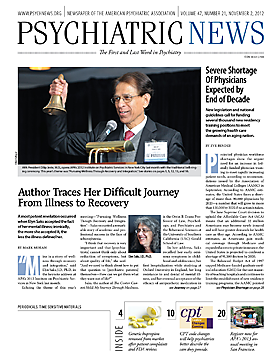Many paths lead psychiatrists to the courtroom. Patients may want you to testify. Courts may request it. Boards may demand it.
Bad rulings in legal or administrative proceedings are not the only problematic outcomes to a hearing. Poorly managed “litigation stress” can sideline you as effectively as anything a judge or jury can contrive.
Don’t allow your reflexive desire to heal and to support—and your haste to get back to your day job, whatever the cost—cause you to lose sight of your own personal and professional needs. What can you do to ensure that you aren’t harming yourself while trying to help everyone else?
Preparation Is Critical
Some witnesses start preparing themselves mentally the night before the hearing … or in the taxi on the way to the courthouse … or during those few moments between the time they’re sworn in and when the attorneys start to ask questions.
You don’t want to be that physician; your insurer doesn’t want you to be that physician either. Successful courtroom appearances result from patient, stepwise strategies that are devised well in advance of the hearing.
Time spent in overall preparation will help you identify all of the relevant facts at your fingertips. Proper planning will leave plenty of time to arrive promptly and wait your turn to testify, with good directions and adequate coverage. Perfection will come with practice, as you rehearse your arguments on your own and in the presence of counsel. Counsel’s advice on these and other matters will occur during the pretrial conference you’ll insist on having, during which the many potential pitfalls of your court appearance will be reviewed. When you take the stand, presentation will be up to you. Just what sort of physician do you want everyone to see: the dedicated and objective healer—or the jaded know-it-all?
Care and Feeding
Experienced attorneys know that all of this careful preparation can still go to waste if the doctor is distracted, out of shape, and sleep deprived.
With a court appearance in your future, time management is critical. Two common extremes are “hurry up” and “stop.” The first involves throwing yourself into a frenzy of activity to take your mind off the unpleasant tasks to come, while the second involves bringing your home life and your practice to a dead halt.
Neither one of these approaches is adaptive. One proven time-management principle is no new burdens. Rather than filling time, your goal should be clearing time. Nonessential professional activities will simply have to wait.
Personal activities are another matter. Resist the temptation to sacrifice diet, exercise, and sleep as a means of ensuring a flexible schedule. Flexibility is meaningless when the body and spirit are too enfeebled to respond. Make a conscious effort to pursue usual recreational activities with family and friends.
On the Hot Seat
When the fateful day arrives, avoid distracting modes of dress—such as flashy watches and other eye-catching accessories. Mobile phones should be turned off completely; e-mails and text messages will have to wait. Successful witnesses do not project the sense that they have more important places to be.
If you have a complex story to tell, ensure ahead of time that counsel is prepared to draw it out of you in the appropriate fashion, point by point. Judges take a dim view of “narrative testimony” in which the physician hijacks the proceedings.
You won’t always know whether you need to answer certain questions. Leave enough time before responding to allow the attorneys to object if they have to. This also gives you enough time to make sure you really mean what you’re about to say.
Never attempt to shade the truth on the witness stand, even for the most transparently noble of reasons. Lawyers spend their careers figuring out how to trick you into overreaching and won’t hesitate to punish you if you do. “I don’t know” and “I don’t recall” are perfectly acceptable responses if accurate.
These are but a few of the most important considerations for psychiatrists to consider when venturing into the adversarial jungle of the courtroom. Your attorney—and your colleagues who have been there before—will provide you with additional detailed advice on how to avoid inadvertent self-harm. You, your patients, and the legal system all deserve better.

Eric Y. Drogin, J.D., Ph.D., is an attorney and an instructor in psychology at Harvard Medical School and in the Program in Psychiatry and the Law at Beth Israel Deaconess Medical Center. He is also the second author, with Thomas Gutheil, M.D., of The Mental Health Professional in Court: A Survival Guide from American Psychiatric Publishing. APA members can purchase the book at a discount at www.appi.org/SearchCenter/Pages/SearchDetail.aspx?ItemId=62438 .

